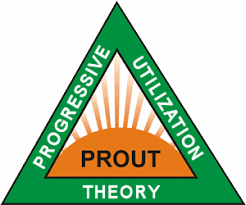– Jagdish Dev
Prout, or the Progressive Utilization Theory, is indeed a comprehensive socio-economic model developed by Prabhat Ranjan Sarkar in the mid-20th century. It aims to address economic, social, and environmental issues through principles like decentralized planning, maximum utilization and rational distribution of resources, and ensuring the welfare of all individuals. While Prout offers an intriguing alternative to capitalism, there are several reasons why it hasn’t gained widespread acceptance or implementation:
- Lack of Awareness and Understanding: One major hurdle for Prout is the lack of awareness and understanding about its principles and potential benefits. Many people, policymakers, and economists might not be familiar with Prout or may misunderstand its concepts.
- Political and Economic Interests: Establishment of any alternative socio-economic model faces resistance from entrenched political and economic interests. Powerful entities that benefit from the current capitalist system might resist change that threatens their influence or profits.
- Complexity and Implementation Challenges: Implementing a new socio-economic model like Prout on a large scale involves significant challenges, both practical and theoretical. It requires reorganizing institutions, policies, and mindsets, which can be complex and met with resistance.
- Historical Context and Ideological Differences: The dominance of capitalism has historical roots and is deeply ingrained in many societies. Moreover, ideological differences and geopolitical tensions can hinder the adoption of alternative models like Prout.
- Global Coordination and Cooperation: Addressing issues like global warming and economic disparity requires international cooperation and coordination. Convincing different nations with diverse interests to adopt a new socio-economic model poses a significant challenge.
To establish Prout or any alternative philosophy on the ground as an alternative to capitalism, several steps can be taken:
- Education and Awareness: Increasing awareness and understanding of Prout’s principles and benefits through education, advocacy, and public discourse can lay the foundation for acceptance and implementation.
- Pilot Projects and Demonstrations: Implementing small-scale pilot projects or demonstrations of Prout’s principles in local communities can showcase its feasibility and effectiveness, building momentum for broader adoption.
- Collaboration and Networking: Building networks and collaborations among like-minded individuals, organizations, and communities globally can create a supportive ecosystem for the adoption of alternative socio-economic models.
- Policy Advocacy and Reform: Advocating for policy reforms that align with Prout’s principles at local, national, and international levels can create enabling environments for its implementation.
- Innovation and Adaptation: Continuously innovating and adapting Prout’s principles to local contexts and evolving challenges can enhance its relevance and practicality.
- Leadership and Grassroots Movements: Leadership from visionary individuals and grassroots movements advocating for socio-economic change can catalyze broader societal shifts towards alternative models like Prout.
Ultimately, establishing Prout or any alternative socio-economic model requires a combination of grassroots mobilization, political will, international cooperation, and visionary leadership to navigate the complexities and challenges of transitioning away from capitalism towards a more equitable and sustainable future.
“Those who support this principle may be termed “Proutists”.
The principles of Prout depend upon the following fundamental factors:
- No individual should be allowed to accumulate any physical wealth without the clear permission or approval of the collective body.
- There should be maximum utilization and rational distribution of all mundane, supramundane and spiritual potentialities of the universe.
- There should be maximum utilization of physical, metaphysical and spiritual potentialities of unit and collective bodies of human society.
- There should be a proper adjustment amongst these physical, metaphysical, mundane, supramundane and spiritual utilizations.
- The method of utilization should vary in accordance with changes in time, space and person, and the utilization should be of progressive nature.
Hence, ours is a Progressive Utilization Theory (Prout).”
5 June 1959, Jamalpur, from “The Cosmic Brotherhood” By Shrii Prabhat Ranjan Sarkar.
Scientific research, guided by progressive ideas, should extract more and more service from the same human potential. It is not a sign of progress to use outdated technology in an age of developed science.
Society will have to bravely confront different types of obstacles, large or small, that are likely to arise due to the use of various resources and materials created by progressive ideas and developed technology. Through struggle, society will have to move forward towards victory along the path of all-round fulfilment in life.
“Pragatishiila upayogatattvamidaḿ sarvajanahitárthaḿ sarvajanasukhárthaḿ pracáritam.” ( This is the Progressive Utilization Theory, propounded for the happiness and all-round welfare of all. )





